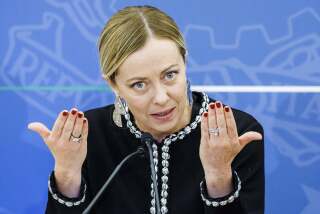ITALY : Voters Are Forcing Reform of Nation’s Political System : Citizens make it clear they want a government that is less corrupt and more responsive to the popular will.
- Share via
ROME — With a ferocious shove from fed-up voters, Italy’s party-dominated political system is being pushed toward reform.
Last weekend Italians overwhelmingly approved a referendum on electoral reform, the substance of which was less significant than its message: Build a government that is less corrupt, more responsive to popular will and better able to confront national challenges.
This weekend, Establishment parties that have tightly controlled the Italian political universe since the end of World War II may get another shock.
Leoluca Orlando, a maverick former mayor of Mafia-throttled Palermo, is leading a breakaway reform movement in elections for a new regional government in Sicily. If he runs well, there will be repercussions all the way to the Alps.
Of growing national preoccupation is a political system that appears to foster instability--50 governments in the past 45 years--but in fact inhibits both change and dynamism. Ministers play musical chairs, and political leaders are monotonously recycled. Giulio Andreotti is now prime minister for the seventh time. His party, the Christian Democrats, has been at the heart of every one of the postwar coalition governments.
Most of them have been weak. None has effectively addressed longstanding national ills that now jeopardize Italy’s place in the new Europe: rampant organized crime, alarming government deficits, woeful public services and a widening social and economic gap between the rich industrial north and the poorer, crime-ridden south.
Despite the disarray, Italy has become one of the world’s richest industrial societies. Next month, Andreotti will sit in London with the leaders of six other world economic powers to mull the future of Soviet President Mikhail S. Gorbachev.
Now it is time, Italian voters are saying, to match their economic Ferrari with a political system more roadworthy than their rusty Model T.
Analysts see last week’s referendum as a major step toward reform. With a 50% quorum needed, there were doubts whether enough Italians would bother to vote to make the results valid. But 62.5% of 47 million voters went to the polls.
By a breathtaking 95%, they approved a reform to reduce fraud by cutting from four to one the number of candidates any party may present in any one constituency. The old system encouraged skulduggery, particularly in the south, where candidates bought and sold second-, third- and fourth-choice votes. One former mayor of Catania estimated that the Mafia controls about half a million votes in Sicily.
The current electoral system was conceived in the wake of fascism to be as broadly democratic as possible. So is it that more than a dozen parties and movements are represented in a national Parliament infamous for dilatory rhetoric and legislative gridlocks as daunting as the Roman traffic.
There is no strong executive. The president is a figurehead. The prime minister is typically hostage to a fractious Parliament, mirroring jostling within his own party and its coalition partners.
Reform is an idea whose time has come. The Christian Democrats, their Socialist allies and their Communist enemies, known as the Democratic Party of the Left, all have plans of their own. They range from a French-style president to a German-style chancellor to a weighted electoral system that would favor larger parties.
There is no consensus, though, and little movement toward one. But observers believe that the parties cannot ignore the voters’ fix-it demand. Indeed, in the wake of the referendum, President Francesco Cossiga, himself a restive figurehead, hinted he could dissolve Parliament and call new elections if there is no action on reform.
More to Read
Sign up for Essential California
The most important California stories and recommendations in your inbox every morning.
You may occasionally receive promotional content from the Los Angeles Times.












